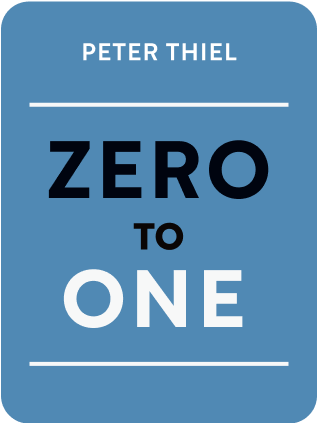

This article is an excerpt from the Shortform summary of "Zero To One" by Peter Thiel. Shortform has the world's best summaries of books you should be reading.
Like this article? Sign up for a free trial here .
What is optimism, and what does it have to do with your business strategy?
Business is all about planning for the future. So when you ask yourself, “What is optimism?” you should be thinking about your business and its future. What is optimism in business? Keep reading to find out.
How Can Positive Thinking Help Your Business?
Businesspeople debate whether success comes from luck or design. Some popular writers and leaders emphasize luck and downplay the importance of design or planning in contributing to success. This makes many people think planning—trying to shape the future—is pointless. They’re not taking their own power to shape their plans, which asks the question: What is optimism in business? Why do you need it?
For instance, author Malcolm Gladwell writes in Outliers that success results from “lucky breaks and arbitrary advantages.” Warren Buffett notes that he was lucky to be born with certain qualities. Jeff Bezos and Bill Gates both claim luck played a role in their success.
It’s possible luck could play a role in an individual success, but luck isn’t sufficient to explain how the same person—for instance, Elon Musk, Jack Dorsey, Steve Jobs—could achieve a series of extraordinary, multibillion-dollar successes.
When Dorsey, the founder of Twitter and Square, tweeted in 2013 that “Success is never an accident,” most of the responses were dismissive, citing white male privilege over intelligent planning as the biggest factor in success. However, while connections, wealth, and experience—and luck—can be factors, in recent years, we’ve tended to ignore or overlook the importance of planning.
In the past, people thought differently. From the Renaissance and the Enlightenment into the 20th century, people believed you made your own luck by working hard. Ralph Waldo Emmerson wrote, “Shallow men believe in luck, believe in circumstances … strong men believe in cause and effect.”
Today, whether you think of the future as determined by chance or design affects how you act in the present and whether you ultimately succeed.
Types of Optimism
When you ask yourself “what is optimism,” remember that there are two kinds of optimism in business.
1) Definite Optimism
The definite optimist believes the future will be better as a result of planning and effort. Scientists, inventors, and entrepreneurs with this outlook made the world richer; advances in science and medicine increased lifespans.
For instance, the advances included:
- 1843: a tunnel under the Thames River
- 1914; the Panama Canal
- 1929-31 the Empire State building
- 1933-37: the Golden Gate Bridge
- 1956: beginning of the Interstate Highway System
- 1961-72: 12 men on the moon
From the 17th century through the 1960s, the prevailing attitude in the Western world was definite optimism. It led to great things, but unfortunately, few people have this attitude today.
2) Indefinite Optimism
An indefinite optimist believes the future will be better, but attributes this to chance rather than effort or planning. He expects to profit from the future but doesn’t see any way to design it. Usually when people ask “what is being optimistic” they mean the idea of these chance encounters.
Instead of building new things, indefinite optimists rearrange existing things. For instance, bankers make money by restructuring existing companies; private equity investors and management consultants squeeze money from old businesses; lawyers profit from resolving old disputes or restructuring people’s affairs. High-achieving Ivy Leaguers pursue these kinds of careers.
The Baby Boom era produced a generation of indefinite optimists who feel entitled to progress. For those born between the mid-forties and mid-sixties, things seemed to automatically get better every year with the onward march of technology. So Boomers grew up with the expectation of ongoing improvement with little planning.
Even when technology stalled in the 1970s, wealthier boomers kept progressing because of their status, although others were left behind. The boomers who still shape public opinion today believe that what worked for them should continue to work. But they overrate the role of chance and underrate the value of planning.
Indefinite optimism has characterized U.S. thinking since the early 1980s, when a long stock market rise began and finance came to be seen as the driving force of the future. But when you think about “what is being optimistic” you should consider your own role in making optimism real.
Indefinite Optimism at Work
What is optimism and how did it work in American business? In the era of definite optimism that ran through the 1960s, successful people were those who created and built things. If the era continued today, society would need engineers to design future cities to exist underwater or in space.
However, in the current era of indefinite optimism toward the future, the top careers are banker and lawyer. If they don’t go to law school, college graduates find careers on Wall Street since they haven’t learned or planned to do anything specific.
Finance exemplifies indefinite optimistic thinking: You can’t plan for or shape the future, but you’re optimistic you’ll profit from it. The basic tenets are:
- The market is random; you can’t make any definitive conclusions about it.
- You need to diversify to balance wins and losses.
- The best thing to do with money is accumulate it in stock portfolios as opposed to putting it to work in the real economy.
Indefinite optimism pervades other parts of society as well. For instance,
- Politics: Instead of offering definite plans, politicians constantly adjust their positions and image to match what the latest polls tell them people are thinking. The public has become fixated on polls too. We prefer statistical analysis of public opinion to anyone’s vision for the country.
- Government: Instead of coordinating complex, definite solutions to problems like infrastructure, energy, and space exploration, the government focuses on processes for managing problems. This takes the form of insurance—Medicare, Social Security, and other transfer payment programs. As a result, entitlement spending has exceeded discretionary spending since 1975. Increasing discretionary spending would require definite plans for specific problems. However, indefinite process-thinking opts to improve things by writing more checks.
- Science: Ever since 1928, when Alexander Fleming accidentally discovered penicillin, scientists have sought to exploit chance (indefiniteness) with probability and statistics. For example, pharmaceutical companies search millions of combinations of molecular compounds hoping to discover a new drug. Similarly, researchers in biotech startups test things that might work instead of improving definite theories.
Where Indefinite Optimism Leads
It’s hard to say where indefinite optimism will lead, but it won’t get us from 0 to 1. That would take a definite optimist with a plan. Not someone who wonders “what is being optimistic” without a plan.
Our outlook of indefinite optimism with no planning results in illogical decisions. An example is how households and companies handle money. If we were definite optimists, our households would save money with the expectation of having it to spend later. Companies would invest profits so they could enjoy the rewards of additional wealth. But households aren’t investing, and companies are letting cash accumulate on balance sheets instead of investing in new products—because both households and companies lack definite plans for the future.
Instead of making definite plans, Silicon Valley entrepreneurs often strive for a “lean startup” that can adapt and evolve. Many companies believe there aren’t any certainties when it comes to products—they survey customers, create a minimum viable product, and improve it incrementally. But the way to build a great company is to start with a definite plan and create something new that people didn’t realize they needed.
You can’t expect your business to succeed without a plan to make it happen. Rather than expecting Darwinian evolution, you need to apply intelligent design.
The Value of Planning
So what is optimism – the right kind? Optimism is planning. Steve Jobs succeeded because he was a definite optimist. He had a definite future in mind and definite plans to get there.
Jobs’s obsession with perfect design, the result of intensive planning, is evident to anyone who picks up an Apple device. But his most important design was the one he applied to his business.
Apple changed the world by designing and implementing multiyear plans for new products—not by surveying customers or slightly improving an existing product.
Jobs planned for the iPod to be the first of a new generation of portable devices that would replace the PC, although the iPod was not seen as revolutionary when Apple introduced it. The Western world needs a cultural revolution to return to a definite future that’s planned.
What is optimism in business? Is it a real business plan? It’s definitely one way of planning for the future. Optimism can help you create and execute a business plan.

———End of Preview———
Like what you just read? Read the rest of the world's best summary of Peter Thiel's "Zero To One" at Shortform .
Here's what you'll find in our full Zero To One summary :
- Why some companies genuinely move the world forward when most don't
- How to build a company that becomes a monopoly (and why monopolies aren't bad)
- Silicon Valley secrets to selling products and building rockstar teams






